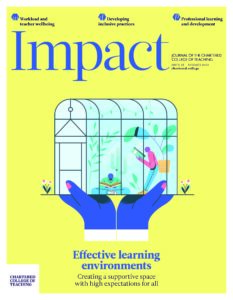‘Doing well and being well’ – what’s the difference? A study of secondary school teachers’ perspectives

7 min read
Rosanna Wilson, Edward Sellman and Stephen Joseph, School of Education, University of Nottingham, UK
Introduction
How do English secondary school teachers engage with the concept of ‘wellbeing education’? The global impact of COVID-19 has emphasised the frontline role that teachers and schools play in supporting children’s wellbeing. Nonetheless, the nature of wellbeing and its relationship with the role of education remain contested. Data collected for this study from teacher interviews (n=20), conducted during the autumn and spring terms of 2020–21, suggests that wellbeing in schools is frequently framed by administrative needs (e.g. the collection of statistics), with limited consideration given to dialogue and inner experience. Teachers interviewed from 10 English secondary schools, ranging in experience from trainees to assistant heads, all regarded wellbeing as the cornerstone of education, particularly focusing on the quality of relationships between teachers and pupil
Join us or sign in now to view the rest of this page
You're viewing this site as a guest, which only allows you to view a limited amount of content.
To view this page and get access to all our resources, join the Chartered College of Teaching (it's free for trainee teachers and half price for NQTs) or log in if you're already a member.
- Ball S, Maguire M and Braun A (2011) How Schools Do Policy: Policy Enactments in Secondary Schools. London: Routledge.
- Biesta G (2009) Good education in an age of measurement: On the need to reconnect with the question of purpose in education. Educational Assessment, Evaluation and Accountability, 21: 33–46.
- Boniwell I, Osin EN and Martinez C (2016) Teaching happiness at school: Non-randomised controlled mixed-methods feasibility study on the effectiveness of personal well-being lessons. The Journal of Positive Psychology 11(1): 85–98.
- Braun V and Clarke V (2006) Using thematic analysis in psychology. Qualitative Research in Psychology 3(2): 77–101.
- Culshaw S and Kurian N (2021) Love as the lifeblood of being-well: A call for care for teachers in England’s schools. Pastoral Care in Education 39(3): 269–290.
- Department for Education (DfE) (2019) Physical health and mental wellbeing (primary and secondary). Available at: www.gov.uk/government/publications/relationships-education-relationships-and-sex-education-rse-and-health-education/physical-health-and-mental-wellbeing-primary-and-secondary (accessed 17 March 2022).
- Department of Health and Social Care (DHSC) and Department for Education (DfE) (2017) Transforming children and young people’s mental health provision: A green paper. Available at: www.gov.uk/government/consultations/transforming-children-and-young-peoples-mental-health-provision-a-green-paper (accessed 17 March 2022).
- Joseph S (2015) (ed) Positive Psychology in Practice: Promoting Human Flourishing in Work, Health, Education, and Everyday Life. New Jersey: John Wiley & Sons.
- Kristjánsson K (2020) Flourishing as the Aim of Education: A Neo-Aristotelian View. Abingdon: Routledge.
- Ofsted (2019) Education inspection framework. Available at: www.gov.uk/government/publications/education-inspection-framework (accessed 17 March 2022).
- Priestley M, Biesta G and Robinson S (2015) Teacher Agency: An Ecological Approach. London: Bloomsbury Publishing.
- Sellman EM and Buttarazzi GF (2020) Adding lemon juice to poison – raising critical questions about the oxymoronic nature of mindfulness in education and its future direction. British Journal of Educational Studies 68(1): 1–78.
- Spratt J (2017) Wellbeing, Equity and Education: A Critical Analysis of Policy Discourses of Wellbeing in Schools. Cham, Switzerland: Springer.
0
0
votes
Please Rate this content
Subscribe
Please login to comment
0 Comments
Inline Feedbacks
View all comments










